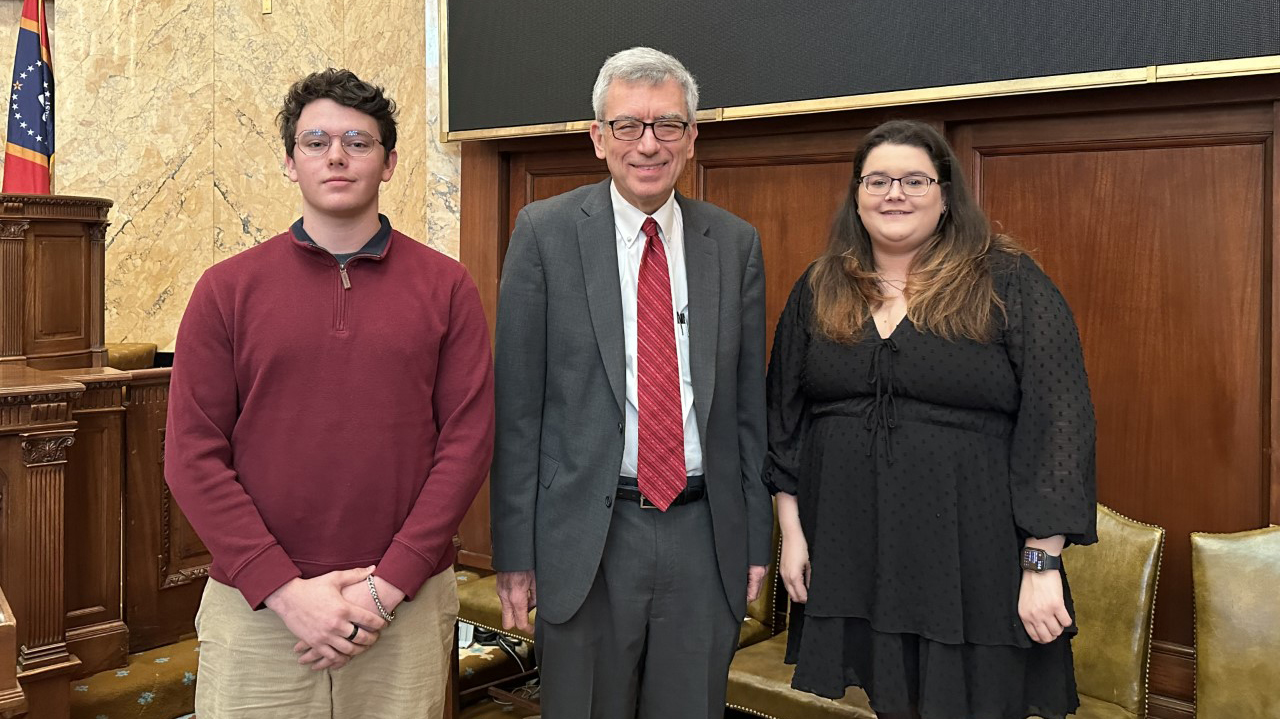University’s only Jewish student community spoke on Auschwitz liberation’s 78th anniversary

State Rep. Tommy Reynolds (center) visits with UM Hillel officers Malachy Bartkus (left), a rhetoric major, and Isabella Gadberry, an allied health major, at the Mississippi Capitol. Gadberry and Bartkus spoke to the House of Representatives chamber on the 78th anniversary of the liberation of Auschwitz, International Holocaust Remembrance Day. Submitted photo
MARCH 5, 2023 BY CLARA TURNAGE
Two students from the University of Mississippi Hillel addressed legislators at the Mississippi Capitol in Jackson on the 78th anniversary of the liberation of Auschwitz, known internationally as Holocaust Remembrance Day.
Isabella Gadberry and Malachy Bartkus, co-president and officer of the UM Hillel board of officers, respectively, spoke about the atrocities of the Holocaust before closing with an El Malei Rachamim, a Jewish prayer asking for care and peace for the dead.
“We can never forget so it never happens again,” said Rep. Tommy Reynolds (R-District 33), who invited UM Hillel to address the House of Representatives chamber. “It was a terrible thing. If we ever forget it, we will never as a people be doing what we need to do.
“It’s a moral obligation that we have to educate the future generations.”
Gadberry, a junior allied health major from Germantown, Tennessee, reminded legislators of the 6 million Jewish lives lost during the Holocaust and of the atrocities committed in Auschwitz, where 1.1 million Jews, Roma, Soviet prisoners of war and other nationalities were murdered before liberation day in 1945, when 7,000 people were set free.
“The writer and Holocaust survivor, Primo Levi, has famously said, ‘It happened; therefore, it can happen again, it can happen everywhere,’” Gadberry said in her Jan. 27 speech. “With remembrance and education comes an additional responsibility: the responsibility to fight persecution wherever it happens.”
Gadberry, who has been a member of UM Hillel since she was a freshman, said she’s found community and friendship in the university’s only Jewish student community.
“Even though the survivors are almost 100 now, it still lives on,” Gadberry said. “Even though many of the survivors are not living any more. We need them to know this can’t happen again. Six million people can’t die just because someone didn’t want them there.”
As time passes and fewer Holocaust survivors remain to tell their stories, it is important for younger generations to take up that mantle, said Jason Solinger, associate professor of English and faculty adviser for the group.
“The anniversary of the liberation of Auschwitz is a solemn day,” Solinger said. “It’s important to commemorate to remember the people whom the Nazis murdered and also to remember that these death camps were established by a modern, industrial power that had been a democracy only a few years before.”
According to a 2022 survey from the American Jewish Committee, antisemitism in the U.S. is on the rise, with 82% of participants noting a change in behavior toward Jewish people in the last five years.
“At a moment when antisemitism seems to be on the uptick, and when we’re losing Holocaust survivors year after year, it’s more important than ever to remember,” Solinger said.
Referencing Sinclair Lewis’ 1935 novel, “It Can’t Happen Here,” Reynolds said remembering the Holocaust is the only way to prevent it from happening again.
“I’ll tell you what; it can happen here,” Reynolds said. “We need to make sure it doesn’t; that’s our responsibility.”